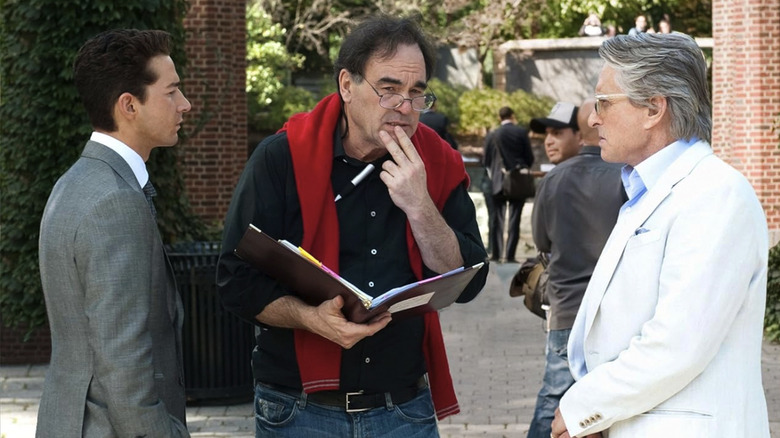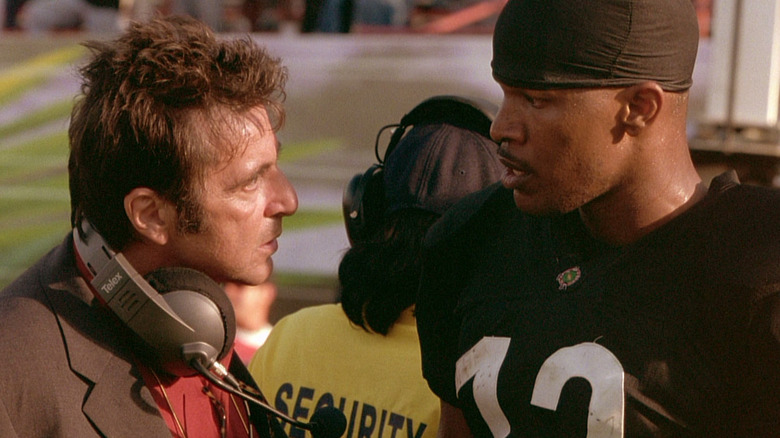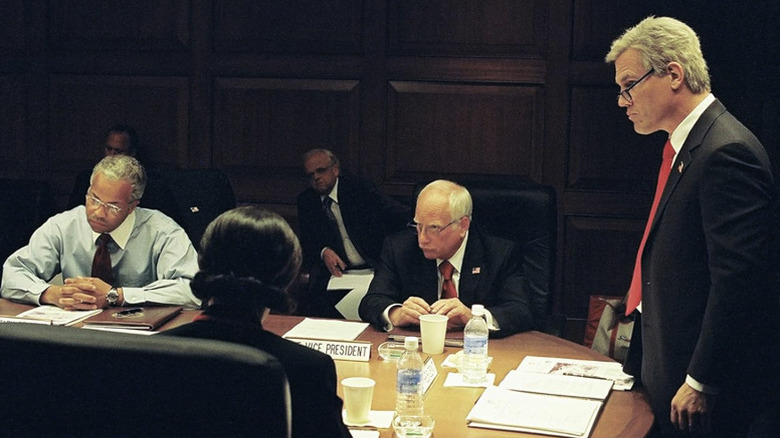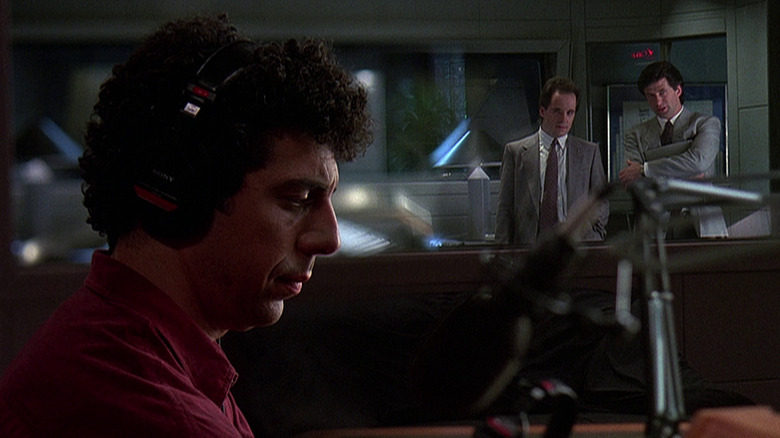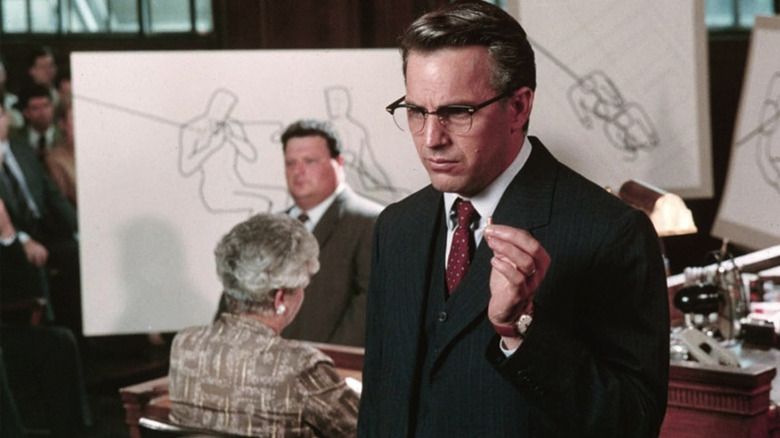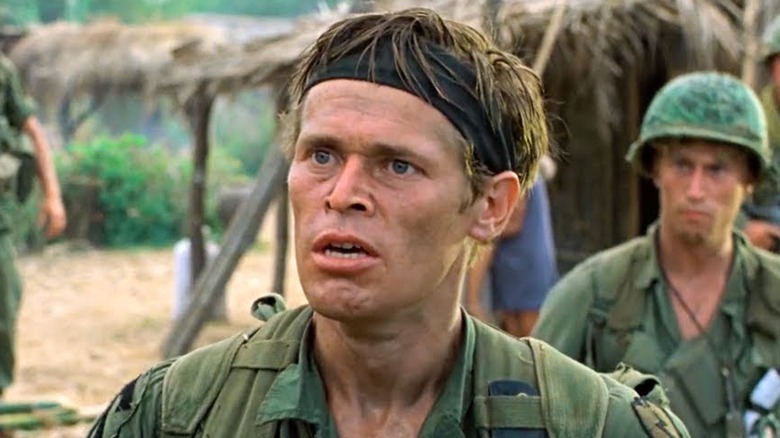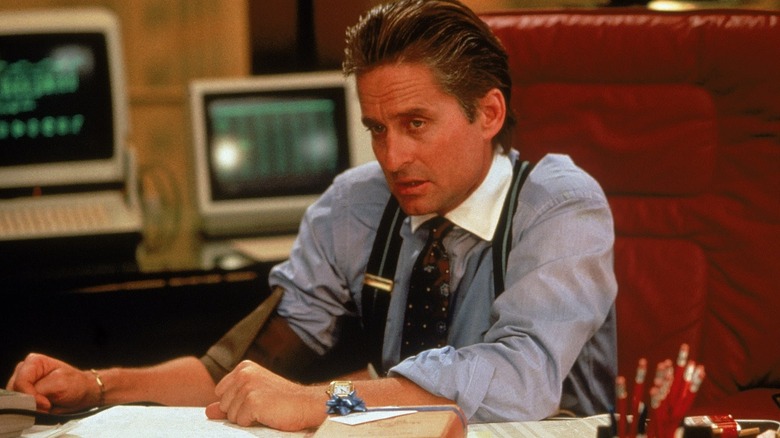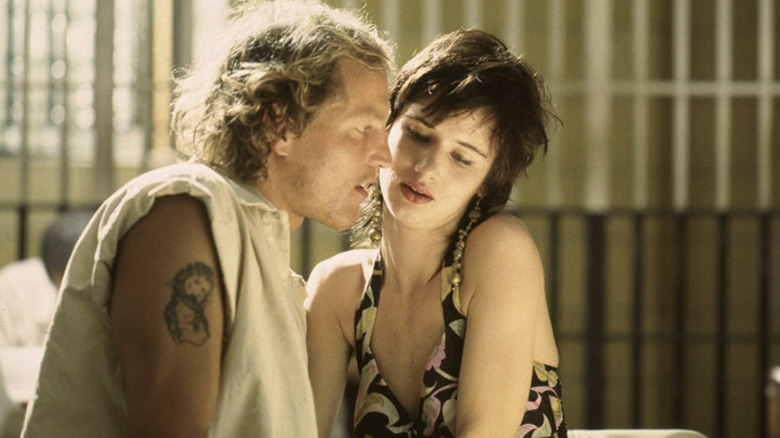The Eight Best Oliver Stone Movies, Ranked
The 1986 war drama "Platoon" was Oliver Stone's fourth film as a director, but it proved to be his breakout in the public consciousness. Before 1986, Stone helmed two horror movies ("Seizure," "The Hand,") and a biopic of war photographer Richard Boyle ("Salvador"), but "Platoon" put him on the map. It was nominated for eight Academy Awards, and won four, including Best Picture and Best Director. Stone immediately emerged as an enfent terrible, ready to interrogate and criticize previously romanticized American institutions. He also became wildly ambitious, seemingly possessing the temerity to assume his films would change the way the public thinks. In some cases, he was right.
Stone wore his politics on his sleeve, and often spoke about how much he hated the American right wing. Two of his films are deeply critical biopics of Republican presidents, and several of his more recent documentaries analyze politicians in power. He has turned his lens on Vladimir Putin, Luiz Inácio Lula da Silva, and Hugo Chávez. He made a film arguing for increased use of nuclear power, and extensively unpacked the origins of the Cold War in his 2012 series "The Untold History of the United States." Why make films, Stone seems to ask, if they're not going to ask provocative questions and challenge the viewer's beliefs?
Stone's career is not free of a few stinkers, however, as his bold stylistic experiments sometimes fail. Additionally, Stone, now 77, could only stay angry for so long, and some might accuse his more recent films of being less bitter and more gentle than his earlier ones. That said, let's sift through Stone's filmography, pick out his eight greatest movies, and determine which are the best. Let's look back on his left-leaning ideas.
To quote a movie that we'll get to shortly, "Back, and to the left."
8. Any Given Sunday (1999)
With "Any Given Sunday," Stone looked to the great American institution of the National Football League, and sought — over the film's prodigious 157 minutes — to examine every last element of it. The main character is a beleaguered football coach (Al Pacino), but it's more of an ensemble drama, also featuring an aging player (Dennis Quaid), a cutthroat team owner (Cameron Diaz), a shady doctor (James Woods), an overly defensive quarterback (Jamie Foxx), and multiple others. The film also features Lauren Holly, Elizabeth Berkley, Matthew Modine, Aaron Eckhart, and LL Cool J.
"Any Given Sunday" is less about its story than it is its sprawl. Stone wants to splay the entire world of organized football bare, creating a film that may be kind of a mess, but is admirable in its ambition. (Pacino's big speech was especially personal to the director.) And in a few key sequences, he also points out that American football is essentially a leisurely parallel to deadly combat. Indeed, a lot of football terminology is derived from military lingo. Watching "Any Given Sunday," one can tell that Stone has a great deal of romantic affection for football, but also that it's part of a semi-corrupt institution. This is one of the better sports movies of its era.
7. Savages (2012)
Admittedly, "Savages" is a hot mess. It's a chaotic, splayed-out jumble of events, and Stone seems to think that a criminal throuple (Blake Lively, Taylor Kitsch, Aaron Taylor-Johnson) is more shocking to modern audiences than it actually is. More than anything, it proved that Stone was, as late as 2012, still capable of going a little crazy with fast edits, swirling criminality, and eye-punching photography. There was still an element of the film student lingering in Stone, and it was a welcome return to form after the massively disappointing "Wall Street: Money Never Sleeps" in 2010.
What sets "Savages" apart is its brief commentary on the war on drugs. The central throuple of "Savages" live in Long Beach and make their living growing marijuana. In 2012, distributing weed was still illegal, and people were still killing each other over control of the trade ... but there's a pervasive sense that the pot-dealing underground is about to draw to a close. One character even notes that it's a matter of days before weed is legal, and all the pride and honor associated with well-moneyed drug cartels is going to instantaneously evaporate. In a subtle way, "Savages" deconstructs generations of crime movies. Hey, criminals: Would you still do it if it wasn't illegal?
6. W. (2008)
Given Stone's politics, one might think his biopic of the notoriously dumb, warmongering George W. Bush would be more acidic. Josh Brolin was a weird choice to play W. as well, bringing a physical presence and confidence to the role that the former president never displayed. Instead, Stone merely pointed to W.'s complete weakness of character, pointing out that his aw-shucks, down-home fratboy persona (on which he campaigned successfully, twice) isn't the same thing as having an ear for policy, or even a basic understanding of government.
"W." also points out that the disastrous quagmires in the Middle East, which Bush started, were all based on bad ideas, lies, and a misguided need for a gibbering pseudo-leader to prove himself to his daddy. It's an oversimplification, of course, but Stone wanted to depict Bush as a simple man. Bush, he argues, was happier as a mediocre baseball manager, and was in way over his head in the world of politics. And yet, he served as president for eight years. All this from a guy who lost sight of the ball.
5. Talk Radio (1988)
A stunning character piece, "Talk Radio" is about a left-wing shock jock named Barry (Eric Bogosian) who hosts a late-night call-in radio show. Barry has trained himself to openly express his most controversial political opinions on the air, leaving him with little more than an army of angry fans and even angrier enemies. He is estranged from his wife, and receives a bomb threat in the mail. Taking place over a single night, "Talk Radio" sees Barry finally breaking down when he reaches the end of his tether. He finally snaps and admits on the air that "shock" radio is nothing more than a commercial enterprise; long ago, he became more interested in the money than the politics.
What he has to face is the fact that other people are listening and are taking him seriously. Although "Talk Radio" was made in 1988, it still feels timely, especially in the age of crazed media-suckling wonks like Alex Jones, Joe Rogan, or Tucker Carlson. Many of these podcasters and radio hosts blither complete nonsense, and they'd be easy to ignore if they didn't have so many people actually taking them seriously. "Talk Radio" is a dark analysis of political media, and how it is all a game ... one that some people will kill for.
4. JFK (1991)
I wasn't alive when John F. Kennedy was assassinated on November 22, 1963, but I grew up hearing all the conspiracy theories about it. I heard all about the suspicious photos, the theories about secondary gunmen, the suspicions attached to multiple suspects. A lot of these theories were dredged up by Stone's 1991 film "JFK," a film that isn't so much trying to solve the Kennedy assassination as capture the tumult of the time. The nation was wounded by the murder of JFK, and chose to mourn his death by picking about the details of it. As long as we were lost in the emotional miasma, Stone figured he could look closely at some facts about the case, arguing that there must have been at least six bullets fired from three different assassins. Lee Harvey Oswald wasn't working alone.
The director's cut of "JFK" is a whopping 205 minutes, so Stone is going to leave no ... well, leave no stone unturned. "JFK" does come to a definite conclusion about the Kennedy assassination, but it's not a conclusion one might find in history books. The film is speculative, but feels vital, panicked, and eager to unpack something that had more details than the public realized.
"JFK" also features one of the most impressive ensembles of any film. It was nominated for eight Academy Awards and won two.
3. Platoon (1986)
Stone served in the army in the late 1960s, touring in Vietnam during the height of military operations there. "Platoon" is a semi-autobiographic depiction of his time there, and the horrors he witnessed. Stone seems to value the camaraderie that soldiers can develop, but notes that the death, mayhem, and terror that war begets is certainly not worth the trade. "Platoon" certainly wasn't the first film about the Vietnam War, but it's notable in that it's the first major Hollywood release about the conflict to have been directed by a Vietnam veteran.
"Platoon" not only announced Stone as a major Hollywood player, but set the tone for the cinema of the late 1980s. "Platoon" was released during the horrid corporate glut of the Reagan administration, and well-moneyed, commercial entertainments were ruling the landscape. "Platoon" aimed to deconstruct the retro-war-loving cinema of previous generations, showing that great war epics were, henceforth, going to be less like "The Green Berets" and more like horror movies.
2. Wall Street (1987)
Speaking of the horrors of the Reagan administration...
In the 1980s, Reagan oversaw massive deregulation across most industries, and his policies gave rise to a powerfully rich subculture of yuppies who got rich gutting businesses, embraced greed, and produced nothing more for the world than the carbon dioxide they breathed out. Gordon Gekko (Michael Douglas, who won an Oscar for the role), the central demon of Stone's "Wall Street," is the ultimate semi-deity for that yuppie class, representing the slick anti-cool of stock traders and empty wealth. The young Bud (Charlie Sheen) is seduced by Gordon's smooth talk and moneyed-up lifestyle, but soon learns how his business is useless and unethical.
Eventually, Bud asks Gordon how much money is enough. "It's never enough," he says. Accruing wealth is a game, and the more money you get, the more money you get, period. "Wall Street" not only points out the deep corruption in stock-based systems, but how extreme wealth is bad for the brain. Rich people, Stone implies, are isolated, weird, and terrible, convinced that their bad ideas are good and that their personal intestinal gases smell rosy. (If you want a good interrogation of the Reagan era, watch "Wall Street" and "RoboCop" back-to-back.)
1. Natural Born Killers (1994)
"Natural Born Killers" is presented as a twisted love story about Mickey and Mallory Knox (Woody Harrelson and Juliette Lewis), a pair of abused, damaged lovebirds who freely commit murder whenever the whim strikes. Their love is presented in weird, swirling, MTV-ready montages, and Stone makes extensive use of various film stocks, animation, and weird editing techniques to depict the chaos they live in. Visually speaking, "Natural Born Killers" is Stone's most ambitious and interesting film. It's also one of the most violent films one might see, featuring human splatter in volumes unseen this side of an early Peter Jackson movie.
Beyond the strange, violent, romance tale, though, Stone was interrogating the media of the 1990s, pointing out that — like in "Talk Radio" — shock sells. If there were a pair of charismatic serial killers on the loose, would the public want to see them captured and jailed, or merely venerated for how cool they were? When Mickey admits to a reporter (Robert Downey, Jr.) that he's a natural-born killer, Downey only thrills at the sellability of the line, and not the fact that Mickey has killed so many people.
"Natural Born Killers" was prescient, predicting the public's capacity for bad news and its addiction to doomscrolling. It's very of its time, and yet remains relevant.
